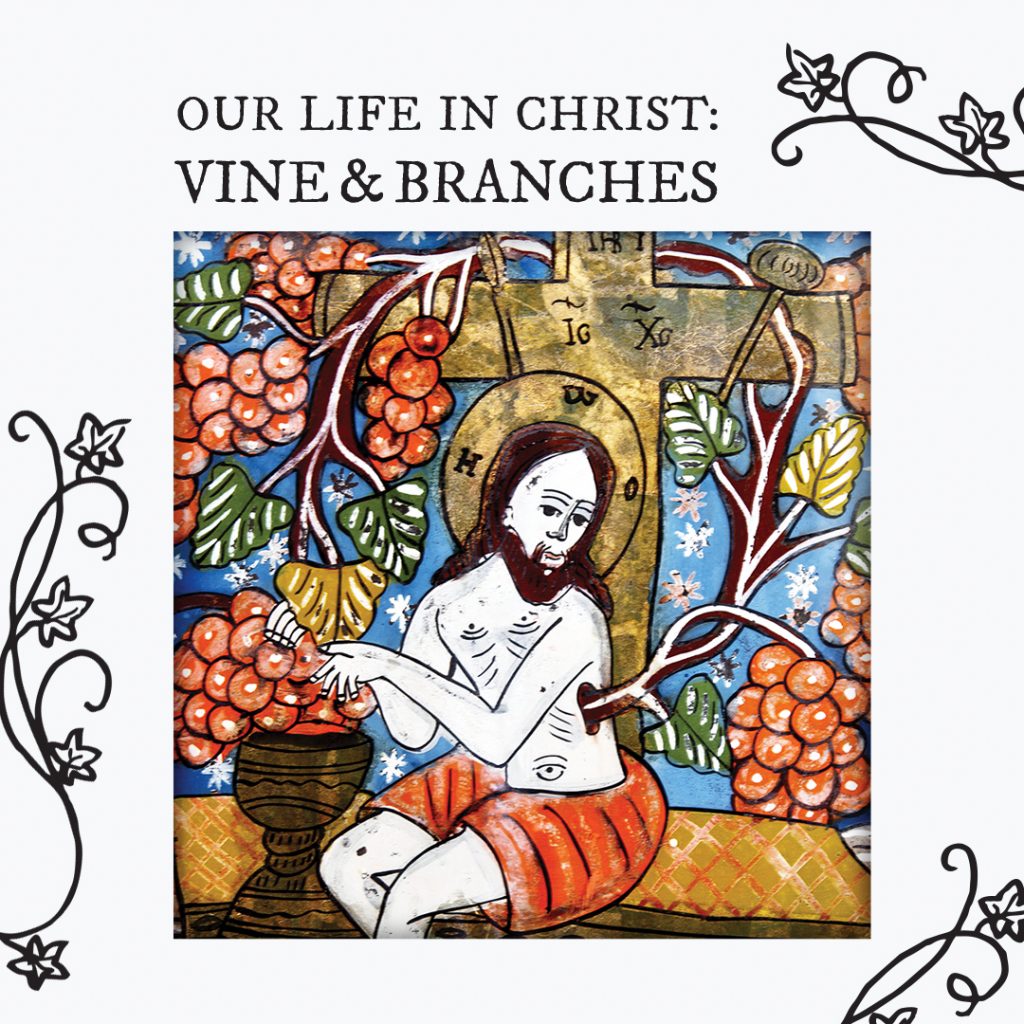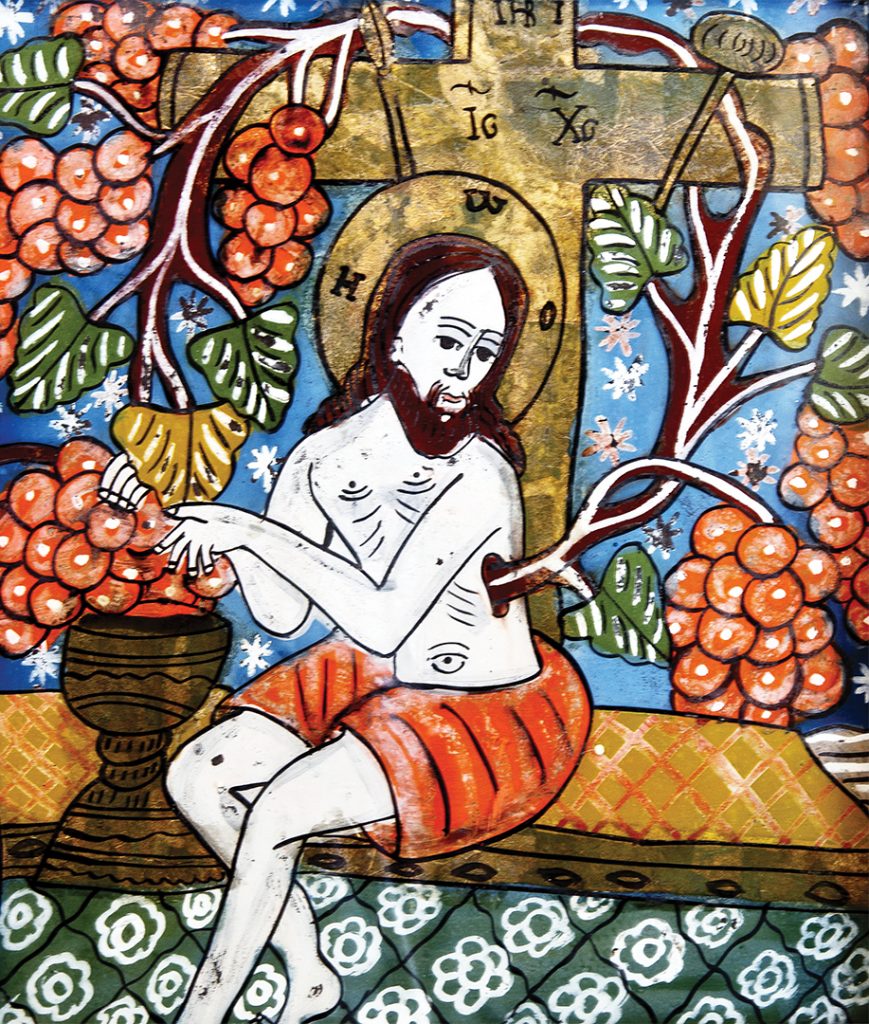Our Life in Christ – Vine and Branches
 by Richard Beinert
by Richard Beinert
I am the Vine; you are the branches. If a man remains in Me and I in him, he will bear much fruit; apart from Me you can do nothing. – John 15:5
About seven years ago, I finally figured out how to graft. I had read about it, fascinated with the wide variety of different apples, plum, apricots, and even pears that you can grow across the Canadian prairies. Why buy a tree when you can order a stick and then graft it onto an established stem? And as a bonus, once fully grown you could have a single tree with many different varieties of fruit, with apples ready to harvest from early August all the way into the later fall. Needless to say, one tree turned into several, and each spring offers a new opportunity to try adding a new variety or seven.
There is something to be learned from this ‘hobby’ as we listen to the words of our Saviour in John 15. Sure, we know this passage and often quote it—but outside of an active interest in fruit tree grafting, the details sometimes blow past us without really sinking in. You see, without the Vine, the branches have no life. We know that; but how often do we live that in our spiritual lives?
In a real sense, Jesus is talking here about the relationship between faith and works. Martin Luther picks up on this in his commentary on John 15, pointing out that works without faith are not really good works at all—and, more importantly, that works without faith can never save us. But the flip side is one that we ought to pay attention to as well. Faith without works is likewise dead. Certainly, this is what James writes in his letter to the churches (James 2:26), but Luther emphasizes it here too—and rightly so. These are, after all, the words of Jesus. Faith blossoms in love to the neighbour, and where this love is absent, Luther writes, faith is likewise a dead thing. He even goes so far as to state that “in the absence of love, doctrine cannot remain pure, nor can hearts be held together in unity.” How’s that for a mouthful! Love and doctrine must go hand in hand, otherwise our Christian life is useless.
You see, without the Vine, the branches have no life. We know that; but how often do we live that in our spiritual lives?
“To be sure,” Luther writes, “the highest and foremost service of God is to preach and hear God’s Word, to administer the Sacraments, etc., as the works prescribed in the First Table of the Decalogue. But the works of the Second Table can also serve God, as, for instance, to honour father and mother, to be patient, to live chastely and decently. For he who lives such a life serves and honours the same God.” But we dare not put the cart before the horse. Fruit follows faith, never the other way around. And so, Luther writes: “We call upon all winegrowers, peasants, and gardeners to testify that the stem, the tree, and the stock must grow before one can produce a pear, an apple, a grape, or any other fruit.” He states this as a self-evident truth which applies to our spiritual lives as well.
And yet, how often do we try to turn the thing around? “Only once I’m good enough should I go to the Sacrament.” “I’m not good enough to go to church today.” Or consider the perennial temptation to think of the church as a place for “us good Lutherans” and not “those sinners” out there. What would Jesus say? (Matthew 11:28-30 might be a good place to start looking!) As Luther writes, “Do you not hear Christ declare here that you are not to look at and judge by such external appearances of works but by the stem and the root from which they grow?” Expecting fruit first is like waiting for your cellphone to show signs of life before you will plug it in to charge it!

“Jesus the Vine.” Romanian icon on glass, 19th century.
This is why Jesus calls upon us to “remain” in Him like branches in a Vine—to “abide” in Him, as other translations put it. The image Jesus paints certainly anchors us in His Word, but it is also much more organic. It involves physical contact, not only with the Vine but through Him also with all the other branches. There is fellowship with Jesus and through Him with the whole Church—and we leave the pruning to our Heavenly Father who is the Vinedresser. Our calling is to draw life from the Vine and then serve our neighbours through our vocations in Christian love.
This sense of the Church has been captured in an iconographic tradition that comes to us from Romania. In it, we see Jesus seated on an Altar, in front of a cross with the instruments of His torture strewn behind Him. What is remarkable, however, is the way in which the Vine flows from Jesus pierced side, producing clusters of fruit. The Vine arches around the head of our Saviour, and He presses the fruit in His hands to give wine for the chalice.
A picture is certainly worth a thousand words, and this is one to ponder. It captures the reality that we are joined with Christ in Baptism and are nourished by the lifeblood of the Vine in the Holy Supper of our Lord. Without Jesus, we can do nothing. And yet, grafted into Him, we grow and produce fruit according to His will and direction as the Holy Spirit teaches us in His Word. Good works that arise apart from Jesus, works that do not emerge from drinking deeply of our Saviour’s lifeblood in the Sacrament, are, according to Jesus’ own teaching, simply not good.
What then does it mean to “abide” and “remain”? Certainly, it means immersing ourselves in the reading of God’s Word. It also means making diligent use of our Baptism to frame our daily lives, as well as maintaining a regular regimen of receiving Christ in the Lord’s Supper. This is where we have that direct connection with Jesus the Vine. But this is more than just a matter of study or works-righteousness on our part. It is a call to abide—or, as the Greek word underneath our English translations suggests, to wait, to linger, even to loiter in the presence of our Triune God as He feeds and nourishes us with the fruit of the cross. It involves pondering and meditating on the fullness of that gift which He gives to us there, to stand in wonder of the grandeur of it—but then also to consider how He feeds us so that our lives are likewise caught up in that flood of divine Fatherly love that comes down to us from the Godhead, in which we find our rest and life and peace.
A big challenge that we face in learning how to “abide,” however, is that our lives are lived at a sprinter’s pace. Jesus calls us to slow down and savour His gift. Like branches grafted onto a fruit tree, we need to remain connected to Him, for it is only through this connection that the branch draws life from the tree itself. We need to abide in Him—to taste and see, as Jesus invites us, that He truly is good.
———————
Rev. Dr. Richard Beinert is pastor of Saint James Lutheran Church in Winnipeg.





